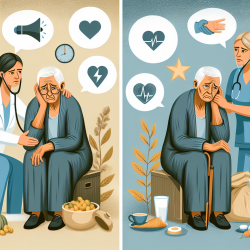Understanding Elder Abuse in Uganda: Key Insights for Practitioners
In a world where the elderly population is rapidly increasing, understanding and addressing elder abuse is crucial. A recent study titled Factors associated with elder abuse and neglect in rural Uganda: A cross-sectional study of community older adults attending an outpatient clinic sheds light on the prevalence and factors associated with elder abuse in Uganda. This blog will explore the study's findings and discuss how practitioners can use this information to improve their skills and care for older adults.
Key Findings from the Study
The study conducted in rural Uganda revealed a high prevalence of elder abuse, with 89% of participants experiencing some form of abuse. Neglect was the most common type of abuse, affecting 86% of the elderly, followed by emotional (49%), financial (46.8%), physical (22.2%), and sexual abuse (6.8%). These findings highlight the urgent need for interventions to protect older adults in Uganda.
Factors Associated with Elder Abuse
Several factors were identified as being associated with elder abuse severity:
- Education Level: Having a secondary level of education was linked to increased abuse severity.
- Physical Impairment: Older adults with physical impairments were more likely to experience severe abuse.
- Functional Dependence: Moderate to severe functional dependence was associated with almost all forms of abuse.
- Perpetrator Presence: Elders who reported the presence of a perpetrator were more likely to experience neglect, emotional, and physical abuse.
Implications for Practitioners
Practitioners working with older adults can use these findings to enhance their care strategies:
- Awareness and Training: Practitioners should be trained to recognize signs of elder abuse and understand the factors that increase vulnerability.
- Screening and Reporting: Implementing routine screening for elder abuse in healthcare settings can help identify at-risk individuals. Encouraging reporting of abuse to authorities can also deter perpetrators.
- Support Systems: Developing support systems for older adults, especially those with physical impairments or functional dependence, can reduce their risk of abuse.
- Community Engagement: Engaging communities in elder protection initiatives can foster a supportive environment for older adults.
Encouraging Further Research
While this study provides valuable insights, further research is needed to explore the psychological impacts of elder abuse and the experiences of neurocognitively impaired older adults. By expanding research in these areas, practitioners can develop more comprehensive strategies to protect and support older adults.
To read the original research paper, please follow this link: Factors associated with elder abuse and neglect in rural Uganda: A cross-sectional study of community older adults attending an outpatient clinic.










